Table of Contents
- FREE 8+ Product Knowledge Templates in PDF
- 1. Product Knowledge Questionnaire Template
- 2. Product Knowledge Class Template
- 3. Product Knowledge Format
- 4. Product Knowledge Meeting Schedule Template
- 5. Product Knowledge Survey Template
- 6. Product Knowledge Test Example
- 7. Product Knowledge Sheet Template
- 8. Basic Product Knowledge Format
- 9. Product Category Knowledge Form
- Advantages of Product Knowledge
- Importance of Product Knowledge
- Types of Product Knowledge
FREE 8+ Product Knowledge Templates in PDF
Product knowledge or awareness is the ability to share information about a public or service and to answer questions. It is considered an important area of knowledge for any position that positions you before customers, investors or the media. Product knowledge is a very important sales skill. Comprehending the characteristics of your goods helps you to correctly and persuasively explain their benefits. Customers respond to enthusiastic sales workers who are excited about their products and who are eager to share the benefits.

FREE 8+ Product Knowledge Templates in PDF
1. Product Knowledge Questionnaire Template
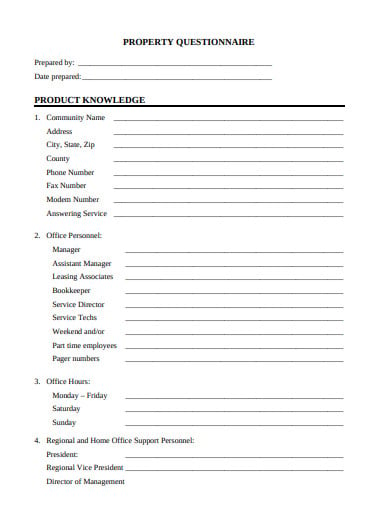 kaleidolearning.com
kaleidolearning.com2. Product Knowledge Class Template
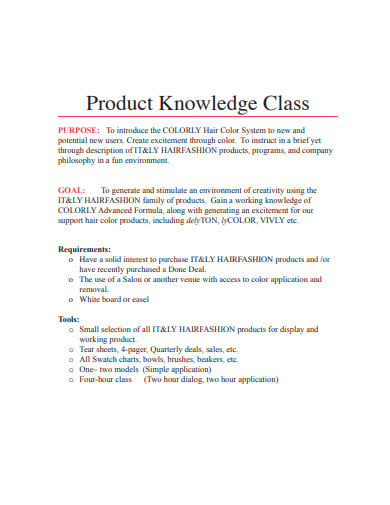 italyhairfashion.com
italyhairfashion.com3. Product Knowledge Format
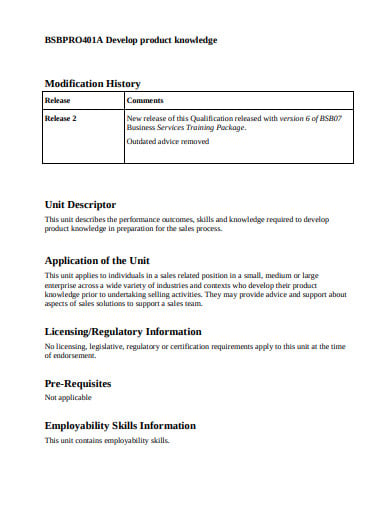 training.gov.au
training.gov.au4. Product Knowledge Meeting Schedule Template
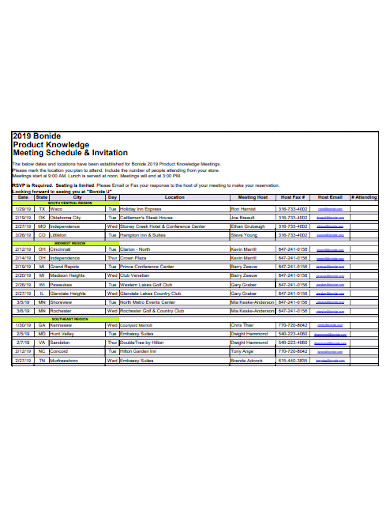 bonide.com
bonide.com5. Product Knowledge Survey Template
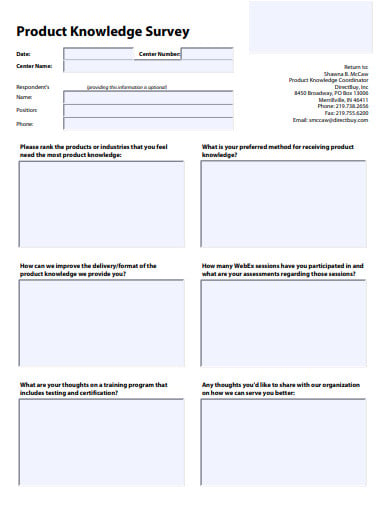 ucctops.com
ucctops.com6. Product Knowledge Test Example
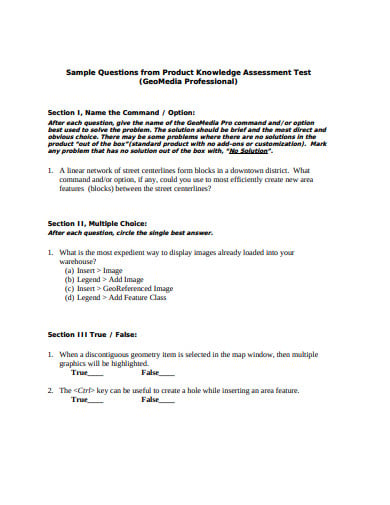 synergy.intergraph.com
synergy.intergraph.com7. Product Knowledge Sheet Template
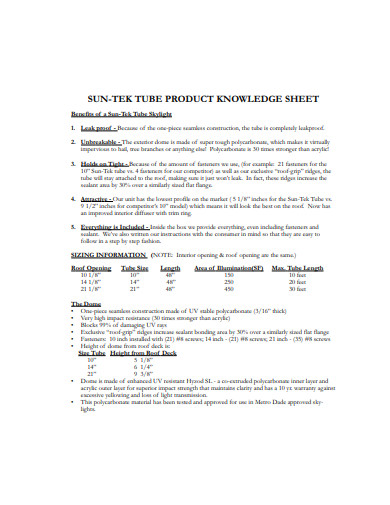 sun-tek.com
sun-tek.com8. Basic Product Knowledge Format
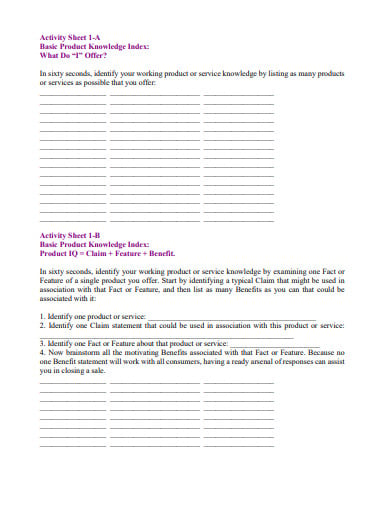 jeffreymagee.com
jeffreymagee.com9. Product Category Knowledge Form
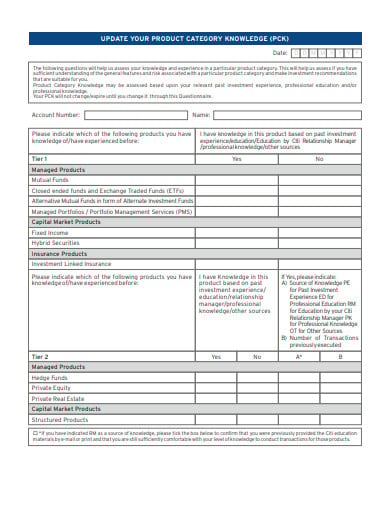 citi.co.in
citi.co.inAdvantages of Product Knowledge
Knowledge is power and the awareness of the goods can be the catalyst for increased sales for your sales force. We’ve already mentioned the reasons why product knowledge is important to your company, but the list below illustrates the advantages of product knowledge — as it relates directly to your sales team.
Strengthen Communication Skills
Detailed and wider knowledge of a product helps a salesperson to use different methods and approaches to deliver a product to consumers of different types. Stronger communication skills allow a salesperson to suitably adjust a sales presentation effectively for greater impact.
Boosts Enthusiasm
A show of excitement and confidence in the product, armed with deep product knowledge, will generate excitement among the consumers and reduce doubt about the solution the product offers for the consumer.
Grows Confidence
If a customer is not truly committed to completing a transaction, the difference may be simply a salesperson’s presence (or lack) of integrity or confidence in the product. Becoming educated about the product and its uses will help cement that trust.
Assists in Overcoming Objections
Factual evidence obtained from industry knowledge can be used to eliminate customer-spoken complaints. Coupled with parallel information about similar products sold by your competitors, solid knowledge about your product gives you the added benefit to effectively counter objections.
Importance of Product Knowledge
Knowledge of the product or service is one of the most significant tools for closing sales. It instills in the customer trust, confidence and respect which creates a positive customer experience. In these cases, the value of product knowledge speaks for itself most:
To Answer Difficult Questions
Before they even call you, most clients will have answered just about every question about your product or service. But, there will always be a couple of questions that will not have answers online, and they’re typically hard questions such as what the customer is supposed to except if he or she has read mixed on the product or service. That is where research on product knowledge is important.
If your team is informed ahead of time on these negative perceptions and has prepared solutions for them, the reply that the customer gets will be very effective and descriptive. When caught off guard, they may become defensive, struggle with their answer, or simply ignore the question, which would result in the consumer losing their confidence because the one issue they couldn’t find an answer in advance has been answered insufficiently.
To Build Trust
Customers need to trust the product or service, the organization and the person they associate with before making a purchase, and by now you probably know that the person they communicate with is weighted much heavier than the other two sources. You need to think about what it means to your client if that which they hear from the salesperson is not the same as what they’ve taken from your website or marketing releases. It destroys all confidence not just in the corporation but in the salesperson as well. This makes it essential for your sales team to have sufficient knowledge about the product and also have the most existing knowledge about the product.
To Build Lasting Connections
One of the reasons why clients are doing so much work on their products and services is that intense rivalry has led customers to conclude that all products are identical. With such a narrow margin of variation in the commodity itself, the companies realize that in other ways they can compensate for the difference. One simple place where you can make a difference is purchasing experience, but to do so takes a thorough knowledge of your purchase.
A customer, for instance, begins the conversation by asking for one product, but the salesperson knows that this customer is actually a better candidate for another product (or even an add-on). The salesperson then goes on to explain the reasons why, and in doing so, he has now explained something to the consumer and proved that the salesperson has the best interest in mind for the customer. That’s sure to create a lasting impression with so many “order takers” in the sales industry right now.
Types of Product Knowledge
Consumer awareness is the ability to communicate details about a product or service and to answer questions. It is considered an important area of knowledge for any position that positions you before customers, investors or the media. For example, a company may provide executive management, sales, marketing, and customer service positions with product awareness training. There are basically fourteen types of product knowledge:
- Customer
- Brand
- Customer Experience
- Competition
- Industry
- Use
- Complementary Products
- Configuration
- Troubleshooting
- Specifications
- Customization
- Integration
- Policy and Procedure
- Mission and Vision

